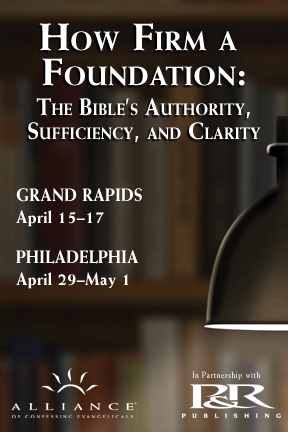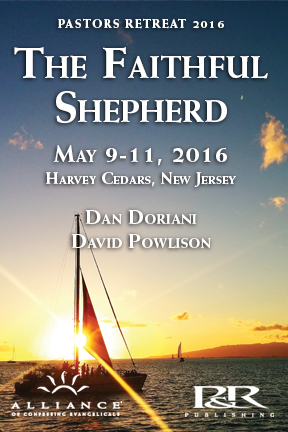This is the sixth in a series of blog posts reading through A Theology of Biblical Counseling, The Doctrinal Foundations of Counseling Ministry by Heath Lambert (Part 1, Part 2, Part 3, Part 4, Part 5).
Today I want to examine Heath’s debatable claim that the Bible is not only sufficient for doctrine but is “equally sufficient for the matters of life, which would include the types of issues addressed in counseling today” [emphasis mine] (42). He bases this on two quotations from historic confessions of faith.
After quoting chapter one of the Second Helvetic Confession, Heath asserts that “the authors of this confession, which summarizes the core doctrinal beliefs held at that time, believed that Scripture was sufficient not merely for what we believe but also for how we live in the face of difficulties” (42).
After quoting a part of chapter one of the Westminster Confession of Faith, and noting that the framers taught that the Scriptures were sufficient not only for doctrine but also for faith and life, Heath asserts, “They believed that it was equally sufficient for the matters of life, which would include the types of issues addressed in counseling today” (42).
The two most important statements I can make in response to Heath’s assertions here are:
1. I agree that the Scriptures are equally sufficient for doctrine and life in the sense that the framers of these confessions intended (i.e. no further special revelation).
2. I disagree that the Scriptures are equally sufficient for doctrine and life in that sense that Heath intends here (i.e. there is no additional general revelation that can help with the types of issues addressed in counseling today).
I believe Heath is mistaken (along the lines of presentism) in reading current counseling debates about the sufficiency of Scripture into historic Reformed confessions that were dealing with a different issue. Heath does acknowledge the debate was different, but he still insists the principles are the same. They’re not, and I disagree with Heath’s presentation of this history. Here’s why.
Sufficient Special Revelation
When the Reformed Confessions were being framed, the debate was over whether the Roman Catholic Church was an equal source of spiritual authority to the Bible. It was not a debate about whether there was general revelation in the world containing truth from God that could be helpful for the Christian life. It was a debate about whether there was another equal source of special revelation in the world – the Roman Catholic church.
It’s in that context, with that protagonist, that the Reformers insisted on the sufficiency of Scripture for doctrine and life. They were utterly rejecting the Roman Church (and any other usurping authority like reason, or subjective impressions) as a source of special revelation and spiritual authority for matters of doctrine and life. They were not rejecting general revelation as a source of truth that could be helpful for the Christian life.
Therefore, I disagree with Heath’s interpretation of these confessions as saying that the Bible is equally sufficient for doctrine and for the types of issues addressed in counseling today. The Reformers “sufficiency argument” was about excluding any so-called special revelation apart from the Scriptures. Heath is using their words on this to argue for something completely different – the exclusion of general revelation from helping with “the matters of life, which would include the types of issues addressed in counseling today.” I think the best way to illustrate this disagreement is with a couple of examples, one of doctrine and the other of life.
Doctrine: Substitutionary Atonement
First, let’s see how the Bible is sufficient for discovering the doctrine of substitutionary atonement. Where do I go for my knowledge of this but the Bible. Apart from the Bible, there is nowhere else in the whole universe that will tell me about how God reconciles sinners to himself by the cross. General revelation cannot tell me that. Philosophy cannot tell me that. Science cannot tell me that. That is a truth that is revealed in its entirety in the Bible – both its general principles and its details. The Bible is totally sufficient for finding out everything there is to know about substitutionary atonement. I don’t open another book to discover God’s truth on this subject. God has not revealed any truth on this subject in any other place. General revelation has nothing to say to me here.
Life: Redeeming the Time
Second, let’s see how the Bible is sufficient for learning about how to manage our time in a God-honoring way – a counseling issue I’m regularly confronted with when people come to me for counsel on how to manage their time in order to avoid or recover from burnout. Again, I open my Bible and start to build a theology of time from the Scriptures. But that doesn’t take me very long because the Bible does not claim to be a book on time-management. There are sufficient general principles (e.g. Exodus 20:8-11; Ps. 90:12; Eccl. 3:1-8; Eph, 5:16, etc.) to act as a biblical framework, but there are no details on how to work this out in each individual life.
That’s why I disagree with Heath’s statement that “the Bible has as much to say about these matters [the issues and problems that we face in a fallen world] as it does about the truths we must confess [doctrine]” (43). It’s got much to say, but it’s not got as much to say.
Unlike the Bible’s total sufficiency for finding out everything there is to know about the doctrine of substitution, the Bible is not a totally sufficient source of knowledge for finding out everything there is to know about time management, one of the greatest difficulties Christians are facing today.
Sufficient Principles and Filter
I therefore welcome other sources of knowledge – books, websites, and other people’s experiences – to learn how to redeem the time, how to manage time, and adjust to different seasons in life in a way that will please God and do good to me and to others. I don’t put my Bible away at this point, of course. I keep it open and make sure that what I learn from these other sources is consistent with the Bible’s teaching. In this case, I believe the Bible is sufficient to give me theological and practical principles and to make sure that I don’t let anything in from other sources that contradict God’s truth.
I hope you can see that while the Bible is sufficient for doctrine and life, it is not equally sufficient for doctrine and life; it is not sufficient in the same way. In the first case – doctrine – it is sufficient for theological principles and particular details, to the exclusion of general revelation. In the second case – life – it is sufficient for theological /practical principles and for filtering knowledge about the particular details that I discover in general revelation. That is not an equal sufficiency.
All Truth is God’s Truth
There are many other “types of issues addressed in counseling today” that we could use in our second example (e.g. sleep, friendships, conflict-resolution, technology management, etc.). With these life and counseling issues, we again find in the Bible sufficient theological/practical principles and a sufficient filter to help us discover God’s truth about each of these subjects from other sources. And that’s the important point to make. Whatever is true in non-biblical sources is still God’s truth. In His mercy, He has allowed men and women (Christian and non-Christian) to discover truth He has planted in His creation. As John Calvin said:
The human mind, however much fallen and perverted from its original integrity, is still adorned and invested with admirable gifts from its Creator….We will be careful…not to reject or condemn truth wherever it appears….If we regard the Spirit of God as the sole foundation of truth, we shall neither reject the truth itself, nor despise it wherever it shall appear, unless we wish to dishonor the Spirit of God. Shall we say that the philosophers were blind in their fine observation and artful description of nature?…No, we cannot read the writings of the ancients on these subjects without great admiration. But if the Lord has willed that we be helped in physics, dialectic, mathematics, and other like disciplines, by the work and ministry of the ungodly, let us use this assistance. For if we neglect God’s gift freely offered in these arts, we ought to suffer just punishment for our sloths (Institutes 2.2.15-16).
Summary
Again, just to be perfectly clear, I 100% believe these confessional statements that the Bible is a sufficient source of special revelation for doctrine and life. In that sense, it is equally sufficient for doctrine and life. Contra the Roman Catholic Church (and the modern Charismatic movement), we do not need any more special revelation. But, in the context of modern counseling debates about the place of general revelation, it is a mistake to interpret these statements about Scripture’s sufficiency to say that the Bible is “equally sufficient for doctrine and life.” In effect, Heath’s argument on these pages for equal sufficiency ends up excluding general revelation from a helpful role in the Christian life. And if general revelation is permitted a role in the Christian life, but not in doctrine, then it is not equal sufficiency.
Postscript: I have now read ahead a bit and have found sections of the book which seem to be consistent with my second example and with what I have been trying to say in opposition to Heath’s views up to this point. That doesn’t surprise me, based on what I have read and heard Heath say in other places. That’s why I find these early chapters to be so puzzlingly inconsistent and confusing. Is it a case of presuppositions that have not yet caught up with evidences? Or am I completely misunderstanding his words? At any rate, when I started reading page 44 and following, I felt as if I’d stepped into the light. I look forward to sharing that section of the book with you tomorrow.















